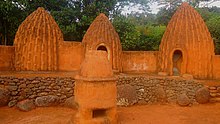Musgum people
Mulwi | |
|---|---|
Chadic peoples |
The Musgum or Mulwi are a
Chadic language, which had 61,500 speakers in Cameroon in 1982 and 24,408 speakers in Chad in 1993. The Musgum call themselves Mulwi.[1]
Distribution


In Cameroon, the Musgum live in the
Baguirmi Empire
. In one word, they are spread in five sub-divisions over six in the Far North Region.
History

The Musgum are
Afro-Asiatic in origin, having displaced the Paleo-Sudanese at the present territory along with other Neo-Sudanese groups. There was frequent battles between the Musgum and the forces of the Bagirmi kingdom from the 17th to 19th centuries. In the 19th century, the eastern Musgums began paying tribute to Bagirmi while the western Musgums faced military pressure from the Fulani under the guidance of Mahdist leader Sheikh Hayatu ibn Sa'id.[2] Some of the Musgum chiefs such as Zigla, Awersing etc. came out with their troops to drive the Fulani out and to take back their areas. As such a tremendous battle was held in the village of Bogo in Diamaré Division ( its name comes from a Musgum word meaning "noise" and refers to the site of the battle). At the fullness of time, that war was followed by the victory of Musgum troops and the loss of the territory by the Fulani groups. That caused them to flee away from Bogo to Adamawa. After having succeeded in the Norh and Adamawa region, some of the Fulani people returned to Bogo where they adopted and mingled with the native Musgums. This is a process whereby a Fulani man decides deliberately to give his daughter to a wealthy Musgum man, or to a man known by his community as chief of a village. Their aim was to inherit by a blood relationship the wealth and chiefdoms. For instance, the kingdom of Bogo which was a Musgum kingdom mixed with Fulani by marriage covenant. Be it in Cameroon or in Chad, Musgum areas are ruled by a native Musgum chief and not by an outsider. For example, the Sultanate of Pouss, the Lamidat of Guirvidig, the Sultanate of Zina, and the Lamidat of Bogo. Musgum people are also known as initiators of "Laba" or Labana
, which is a traditional rite for fighting. In the present day world, the dream of a young Musgum man is to practice a military activity.
Culture
Afro-Asiatic stock).[3]
Many Musgums also engage in agriculture where staple crops include ground nuts and cotton which is sold for commercial use.[4]
Most Musgums profess Islam. However, many traditional beliefs and practices still remain very influential.[4]


See also
- Musgum dwelling units
Notes
- ^ a b c "Musgu". Ethnologue. Retrieved 21 February 2019.
- ISBN 978-1-5381-1968-6.
- ^ Reuters.
- ^ ISBN 978-0-313-27918-8.
References
- "Eight killed as rival fishermen clash in Cameroon". 12 January 2007. Reuters. Accessed 7 January 2008.
- Gordon, Raymond G., Jr. (ed.) (2005): "Musgu". Ethnologue: Languages of the World, 15th ed. Dallas: SIL International. Accessed 2 February 2007.
- Mbaku, John Mukum (2005). Culture and Customs of Cameroon. Westport, Connecticut: Greenwood Press.
- Neba, Aaron (1999). Modern Geography of the Republic of Cameroon, 3rd ed. Bamenda: Neba Publishers.
ABIA Samuel GAOU,(2015 Cameroon)
